Words to Describe Feelings You Didnt Know Existed
The Intrepid Guide contains affiliate links. These commissions help reduce the always-increasing costs of keeping this site agile. Thanks for reading!
From Afrikaans to Zulu, hither are 203 most beautiful untranslatable words in other languages from around the world that should exist in English.
If you've e'er tried to acquire a linguistic communication, then y'all'll know that translating is non e'er an easy job. In that location are over 7,000 languages in the earth and just as many words and ideas that get 'lost in translation' due to differences in grammar and semantics, or even linguistic complications. When a language fails to convey the essence of a word during translation, the give-and-take is considered to be 'untranslatable.'
There are many terms that baste with feeling and emotion that are simply untranslatable into English language. Past taking a closer expect at some of the most beautiful untranslatable words from effectually the world, they can give the states a glimpse into different cultures and belief systems that help united states of america to understand the people who speak these marvellous languages.
English is no stranger to borrowing words from other languages and even inventing new ones like 'hangry', a combination of anger and hunger considering you demand something to consume asap. Then at that place is 'nomophobia', an irrational fear or sense of panic felt when yous've lost your phone or are unable to use it. Even English playwright William Shakespeare invented plenty of words too such as 'faint-hearted' and 'natural language-tied'. These new words have entered English language dictionaries at a fast step, keeping up with the diversity of the English-speaking earth.
In spite of this, the English language language can't explain everything so succinctly, and all the same there are many other languages that have, in simply one word. This comprehensive listing looks at some of the about beautiful words in dissimilar languages that are simply untranslatable into English. Many of which nosotros should definitely borrow.
From Afrikaans to Zulu, hither are 203 of the most beautiful untranslatable words from other languages.
Afrikaans
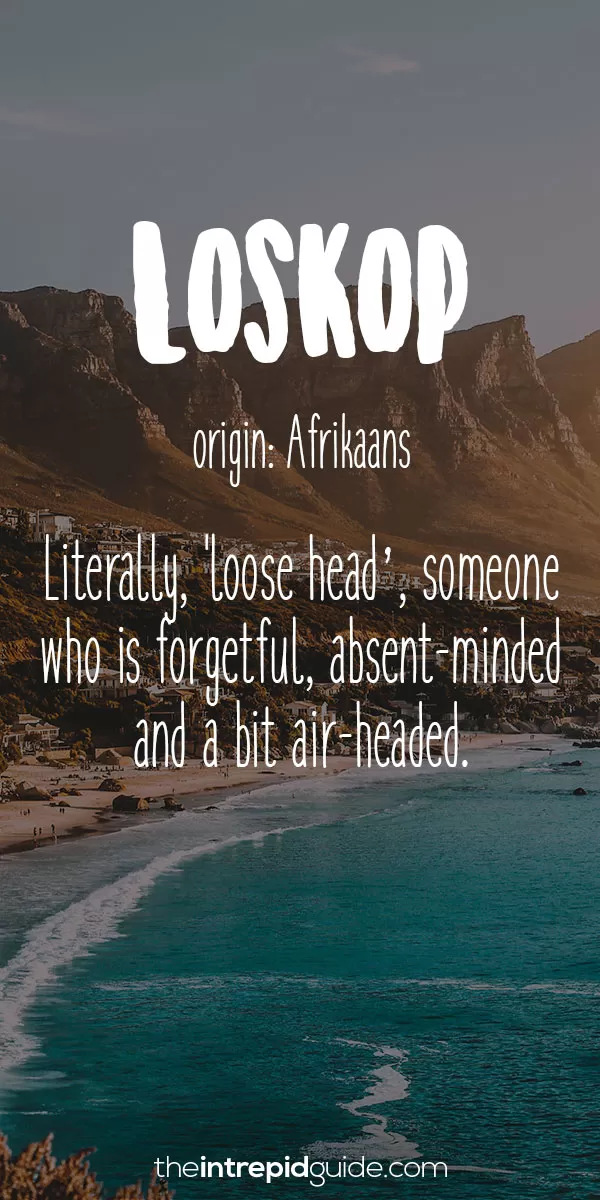
Learn Afrikaans for travel! Become my costless Afrikaans travel phrase guide here.
Albanian
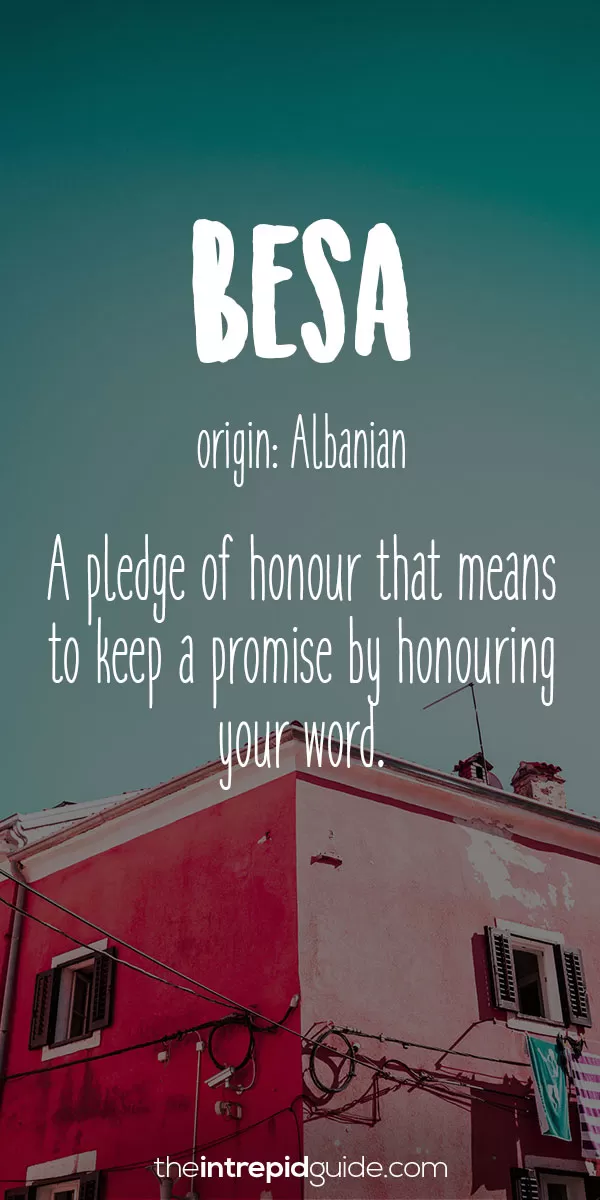
Arabic

Taarradhin (تراض) – Taarradhin is the act of coming to a happy compromise where everyone wins. It's a way of reconciling without anyone losing face.

Learn Arabic for travel! Get my gratis Arabic travel phrase guide here.
Basque
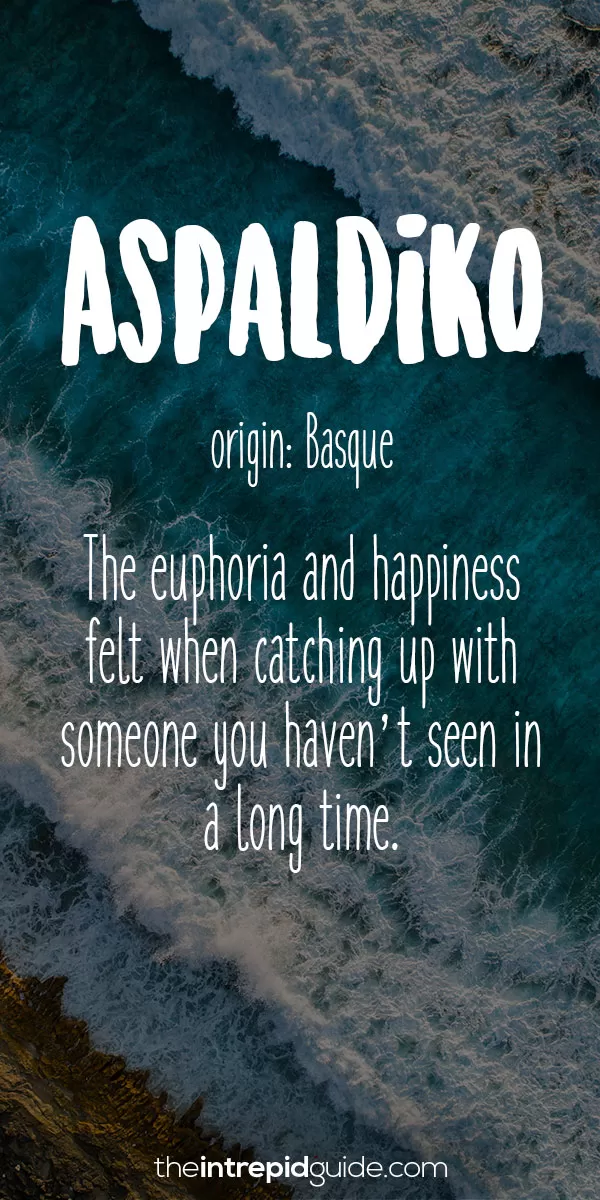
Larn Basque for travel! Get my gratuitous Basque travel phrase guide hither.
Bengali
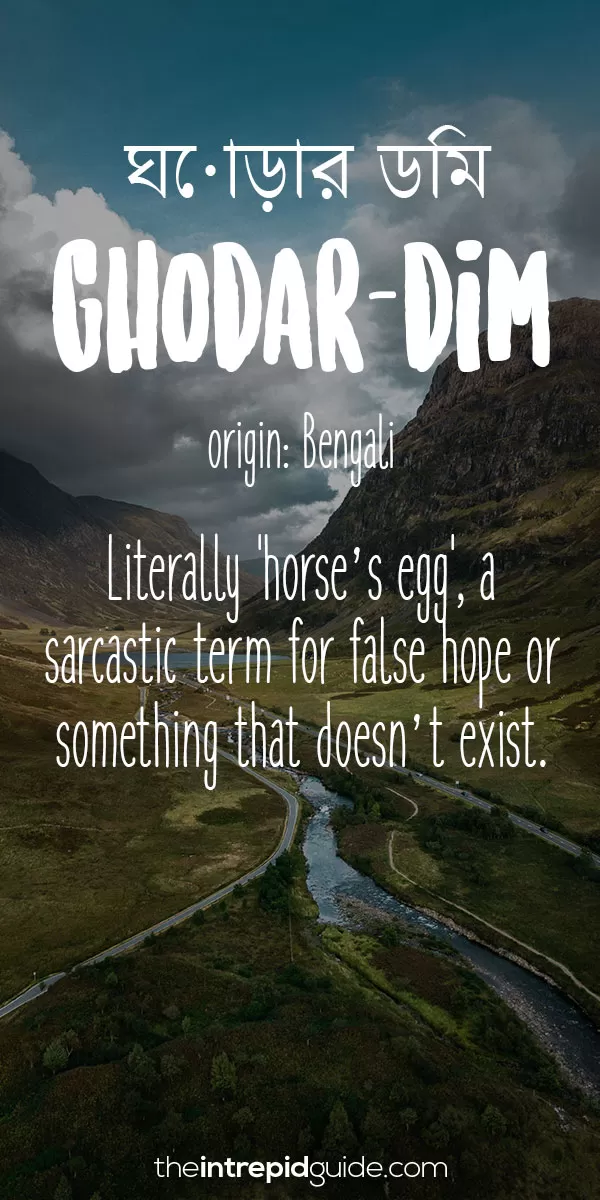
Bulgarian

Larn Bulgarian for travel! Get my free Bulgarian travel phrase guide hither.
Chinese (Mandarin)
Guanxi (关系) – Pronounced [gwan-shee], guanxi is often translated as 'connections', 'relationships' or 'networks' and refers to having a potent personal relationship with someone which involves moral obligations and exchanging favours. This is ane of the essential ways of getting things done in traditional Chinese club. To build up skillful guanxi, you lot practise things for people such as requite them gifts, take them to dinner, or other favours. If yous need to call in a favour then you 'apply upwards' your guanxi.
Once a favour is made, an unspoken obligation exists. Because of this, people oftentimes try to turn down gifts, because, sooner or later on, they may accept to repay the debt. However, the bond of guanxi rarely ends, because one time the relationship exists, it sets up an countless loop that can last a lifetime.

Czech
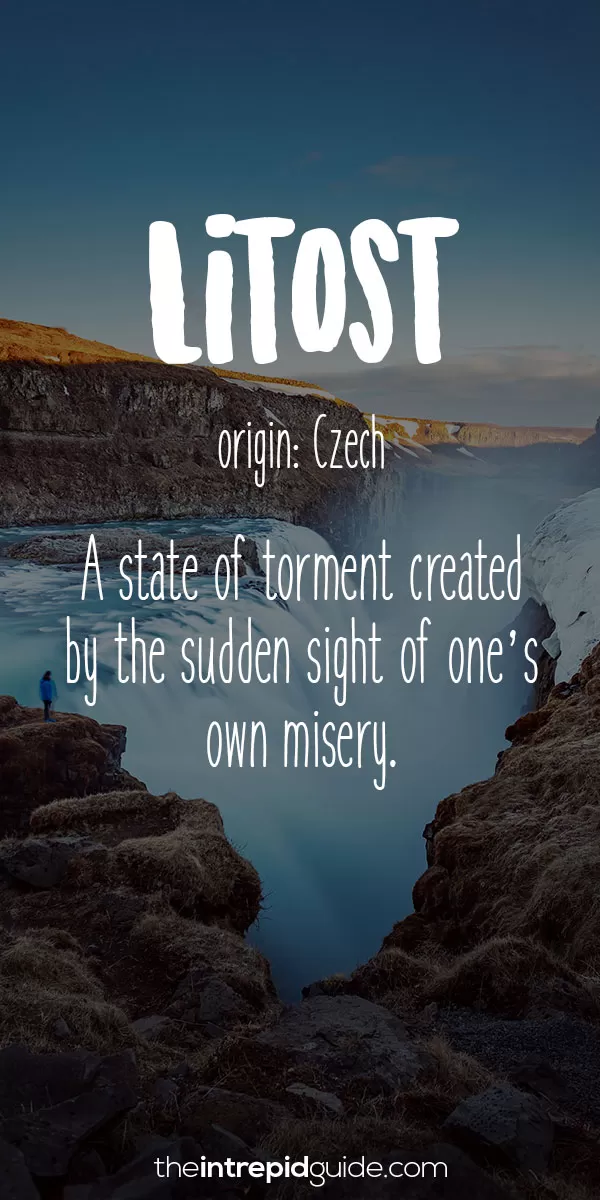
Mít kliku – This Czech verb means to accept luck on your side or be lucky enough to achieve something. It literally means, 'to take a door handle'.
Prozvonit – Prozvonitis when you call simply but let information technology ring one time and then that the other person calls back without so you lot salvage money or minutes.
Learn Czech for travel! Get my gratis Czech travel phrase guide here.
Danish


Learn Danish for travel! Go my gratis Danish travel phrase guide here.
Dutch

Voorpret – Voorpret is the build up of anticipation, joy or pleasance you feel ahead of the actual event such as setting up for a political party and can't assistance merely dance as you do it. Voorpret literally means, 'pre-fun' simply means more than just the anticipation of something fun, information technology's enjoying the apprehension. It'south voorpret!
Gezelligheid – This Dutch word combines the Danish concept of hygge and the German gemütlichkeit. Gezelligheid is the idea of being in a comfy, cozy atmosphere with loved ones, catching upwards with an one-time friend, or just the general togetherness that gives people a warm feeling. It suggests a sense of closeness that many consider encompasses the heart of Dutch civilization.

Learn Dutch for travel! Get my free Dutch travel phrase guide hither.
Estonian

Finnish

Jaksaa – A severe absenteeism of enthusiasm to do something. When yous just don't have enough strength, will power to do something or tin can't exist bothered.
Kaamos — Kaamos is more than simply Polar Night when there are 24 consecutive hours of darkness, kaamos describes the longing for sunshine, and a feeling of depression and lack of motivation and enthusiasm. Information technology signifies long dark days and bad weather, no social life, and a lack of inspiration.
Lieko – A trunk of a tree that has submerged to the bottom of a lake.
Myötähäpeä – Experiencing a shared embarrassment or shame when seeing someone else do something embarrassing. Myö means 'nosotros,' myötä means 'with' and häpeä is 'shame', and so it can be roughly translated to something like 'co-embarrassment' or 'secondhand embarrassment'.

Sauna – A sauna is a small room used equally a hot-air or steam bath for cleaning and refreshing the body. Saunas were invented in Finland several millennia ago and are still a cornerstone of Finnish culture, as well as of every Finnish home. And then much so that, traditionally, when people moved they used to build the sauna first, and but then the house.
Sisu – Sisu is a Finnish concept that describes a stoic resilience, decision and hardiness considered to be necessary to face the difficulties of life in general and of life in harsh conditions in particular. This Finnish term that can be roughly translated equally forcefulness of will, determination, perseverance, and acting rationally in the face of adversity. Sisu isn't momentary backbone, just the power to sustain that courage to see something through.
Tokka – Pronounced [talk-uh] is a Finnish commonage noun for a large herd of reindeer. Information technology is said that at that place are as many reindeer every bit in that location are people in Finland.
Learn Finnish for travel! Get my gratis Finnish travel phrase guide here.
French
Bérézina – A sense of panic associated with a huge defeat. The word Bérézina is used in the French idom 'C'est la Bérézina' meaning a complete defeat, loss. The origin of this expression dates back over 200 years to the banks of the river Berezina in Republic of belarus. It was here that a tearing battle took place between Napoleon'south retreating ground forces and the Imperial Russian ground forces. The battle ended in a victory for the Russian Empire and heavy losses for the French.
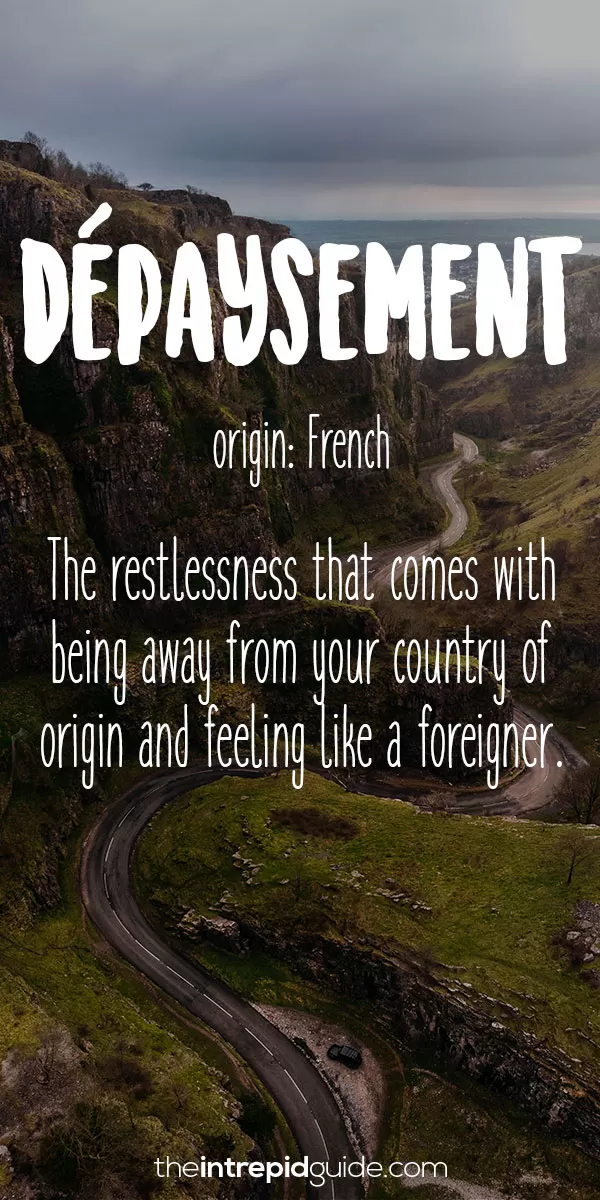
Bricoleur — A bricoleur is a handyman who uses whatever materials he can get his hands on to create a construction (or bricolage). Think of the well-known term Bric-à-brac – miscellaneous objects and ornaments of picayune value. The closest equivalent in English language would be something like a DIY-er.

La douleur exquise – If French is the language of honey, then it seems only fitting that it has a term to describe all the feelings associated with unrequited dearest. La douleur exquise literally means 'the exquisite pain', the pain of wanting something you can't have, such as someone who will never render your feelings.
L'appel du vide – 50'appel du vide is that little phonation in your caput telling y'all to exercise something stupid similar jerking the steering wheel to the right and take a flying leap off the border or staring out at the view from a balustrade and have a sudden urge to jump over the ledge. In English, you might refer to it every bit the call of the Siren song.
Fifty'esprit de l'escalier – Literally 'stairwell wit', 50'camaraderie de l'escalier is the feeling that yous've got the perfect comeback, but you lot think of it also belatedly. Similar to the German language, treppenwitz, mentioned earlier.
Retrouvailles – This beautiful French word ways 'refindings', referring to the reunion you lot would have with someone you care deeply for merely haven't seen in a long time. The English discussion 'reunion' doesn't quite capture this intense feeling.
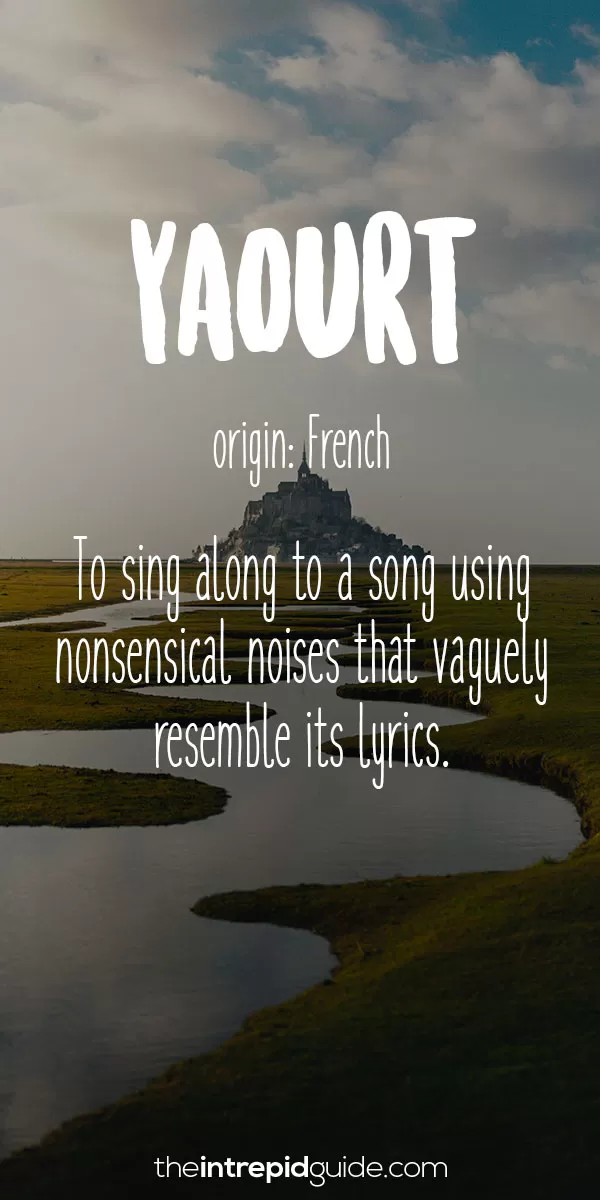
Learn French for travel! Get my free French travel phrase guide here.
Georgian

German

Drachenfutter – Literally, 'dragon provender', this is a gift someone gives to placate and apologise to someone, especially a spouse, later they've done something incorrect or stupid.
Erklärungsnot – The urgent need to explain something, either yourself or the state of affairs. It can too hateful to struggle explaining something. Erklärungsnot is made upwards of the German words Erklärung ('explanation') and not (in this instance, can be translated as 'need.')
Extrawunsch – A term used to call someone who complicates things past beingness fussy or picky, and thus slows things down.
Fachidiot – Fachidiot, literally it means 'subject-idiot'. A fachidiot is a person with expert noesis in their ain field and are well-achieved but are clueless when information technology comes to anything outside that surface area.


Fisselig – This represents a temporary state of sloppiness, unremarkably elicited past a person's nagging. This often means that a person is flustered to the betoken of incompetence.
Kabelsalat – Kabelsalat literally ways, 'a cable salad', a beautiful word to depict the mess of tangled cables.
Handschuhschneeballwerfer – Handschuhschneeballwerfer is High german slang for 'coward'. Information technology literally ways, 'someone who wears gloves to throw snowballs'. In other words, a cowardly person who criticises and abuses something from a condom distance.

Lebensmüde – Lebensmüde is a German language chemical compound noun made up of the words leben (life) and müde (tired), and literally means 'life tired'. It describes the feeling of beingness tired or weary of life. Its closest English equivalents are probably globe-weary, depressed, fed up, restless and dissatisfied.
Schadenfreude – A feeling of joy and pleasure that comes with seeing another'south misfortune. Usually. someone you really dislike.
Schilderwald – A street that is and then overcrowded and rammed with street signs, that you're more than decumbent to getting lost rather than finding your way.
Schlimmbesserung – Something that was meant to be an comeback, only actually makes things worse.
Schnapsidee – Literally, 'schnapps thought', is a plan so ridiculous you lot must take been drunk when you lot idea it up.

Torschlusspanik – This beautiful discussion is used to refer to the feeling y'all experience at a certain betoken in your life where you lot see an imaginary door closing on all your opportunities, and you lot wonder what could have been. Tor means 'gate,' schluss means 'endmost' or 'ending,' and panik means, 'panic.' So, torschlusspanik literally translates to 'gate closing panic.'
Treppenwitz – Maybe the most useful untranslatable word on this list, treppenwitz describes all the things you should have said in the rut of the moment but only retrieve of when it is as well late. As well known every bit, the best improvement line yous never said.
Waldeinsamkeit – The feeling of being lonely in the woods. Derived from two German words 'wald,' meaning wood, and 'einsamkeit,' meaning loneliness, information technology refers to a connectedness with nature and the peace experienced in that moment.
Weichei – Weichei is a German language slang term which used to refer to a cowardly person. Literally meaning 'a soft egg', the closest English equivalent would be 'wimp'.
Weltschmerz – The literal translation of the word is 'world grief', or 'world-pain', a term commencement coined by the German language writer Jean Paul. Weltschmerz refers to a deep sadness near the imperfection and pain of the world.
Verschlimmbessern – Verschlimmbessern describes the human activity of trying to make something better, just to end up making it worse than it initially was. In English language, you might say something like 'to put your foot in it'.
Learn German for travel! Get my complimentary German language travel phrase guide here.
Greek
Filotimo (φιλότιμο) – Filotimo is almost impossible to translate but can be summed upward as 'love of honor'. It describes a person who understands the responsibility to themselves, as a human, beingness to always do the correct matter and with honour. Even if their wealth, safety, liberty, or fifty-fifty life is at peril. No affair what, this person volition do the honourable thing, regardless of the upshot.
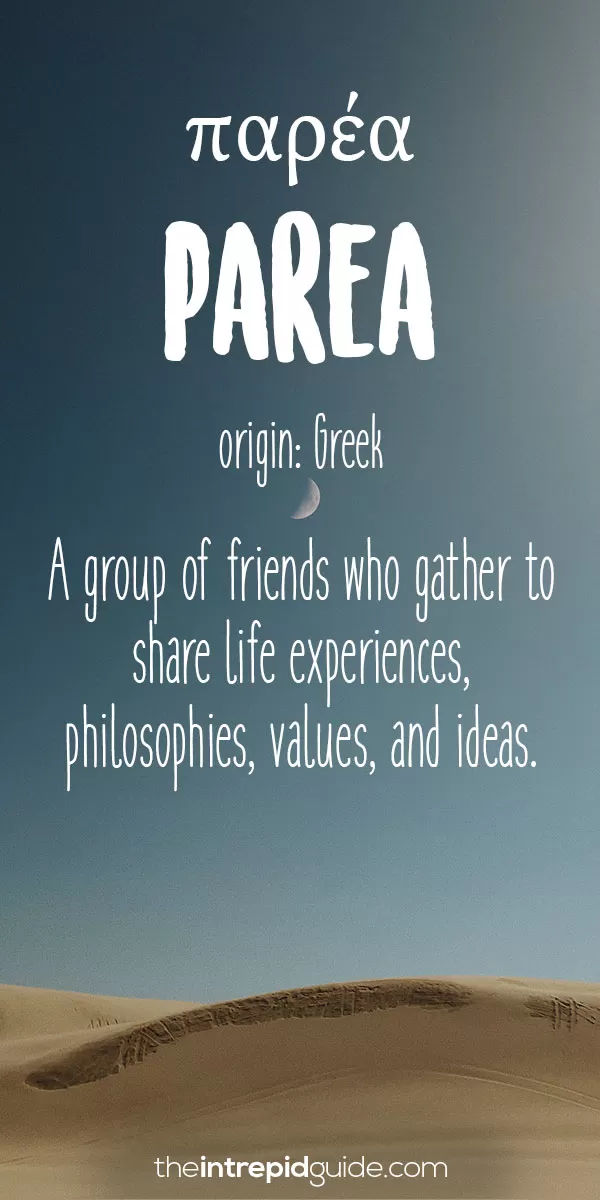
Psithurism (Ψυθισμός) – Psithurism is the rustling sound of leaves in the wind. It comes from the Greek psithuros, meaning 'whispering, slanderous.'

Acquire Greek for travel! Get my gratis Greek travel phrase guide hither.
Hawaiian


Hebrew

Larn Hebrew for travel! Get my free Hebrew travel phrase guide here.
Hindi
Chai-Pani (चाय पानी)– The phrase 'Chai-Pani' literally meaning, 'tea and water', is used to offering welcome drinks and facilitate guests in houses of Republic of india. It can also refer to a ransom given to someone, often a bureaucratic worker, to get a chore done speedily.


Viraha (विरह) – Realising you love someone only later you're separated.
Acquire Hindi for travel! Go my complimentary Hindi travel phrase guide here.
Hungarian
Elmosolyodni – A kind of smile that forms when something isn't especially funny, but you tin't help but smile anyway.
Házisárkány – A nickname for your spouse or ameliorate half who is constantly nagging. It literally ways an 'Domestic Dragon'
Icelandic
Dalalæða – A low waist-deep fog that forms after a warm and sunny 24-hour interval. It literally means, 'a fog that sneaks up from the bottom of a valley' or 'valley-sneak.'

Þetta reddast – Pronounced [THETTA red-ahst], Þetta reddast is Iceland's unofficial motto that loosely translates as 'everything will work out in the terminate'.
Tima – Beingness unwilling to spend fourth dimension or money on a particular affair, fifty-fifty though you can afford it.
Larn Icelandic for travel! Get my complimentary Icelandic travel phrase guide here.
Indonesian
Jayus – A joke so terrible and unfunny that you can't help only laugh. Information technology'due south funny considering information technology's non funny, kind of like a dad joke.
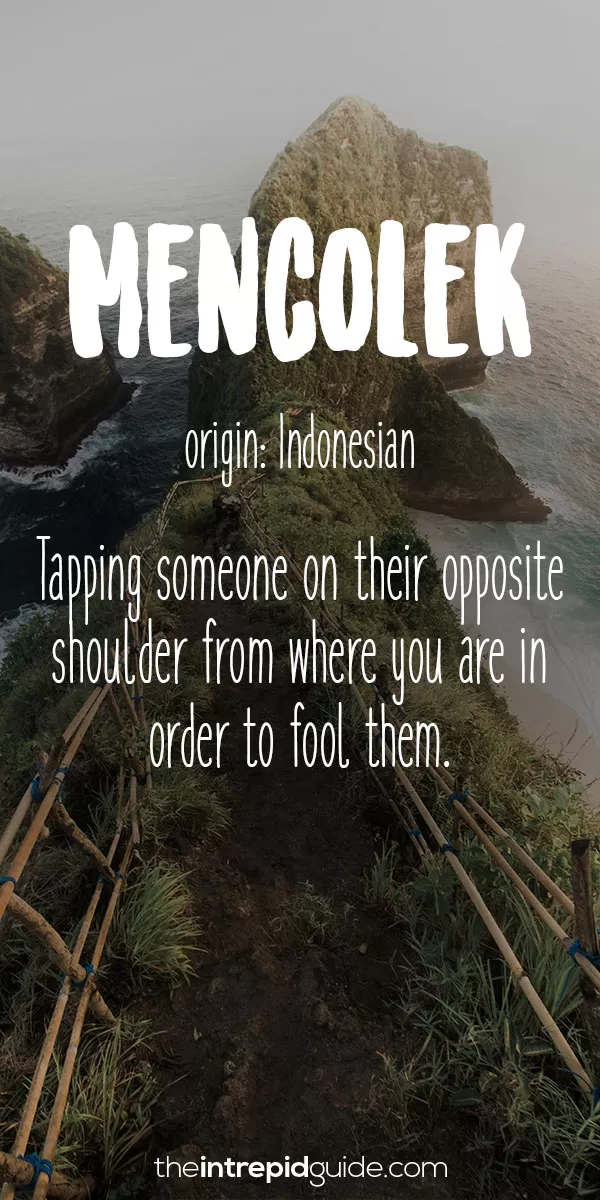
Inuit

Irish
Cúbóg – A batch of Easter eggs.
Learn Irish for travel! Get my complimentary Irish gaelic travel phrase guide here.
Italian
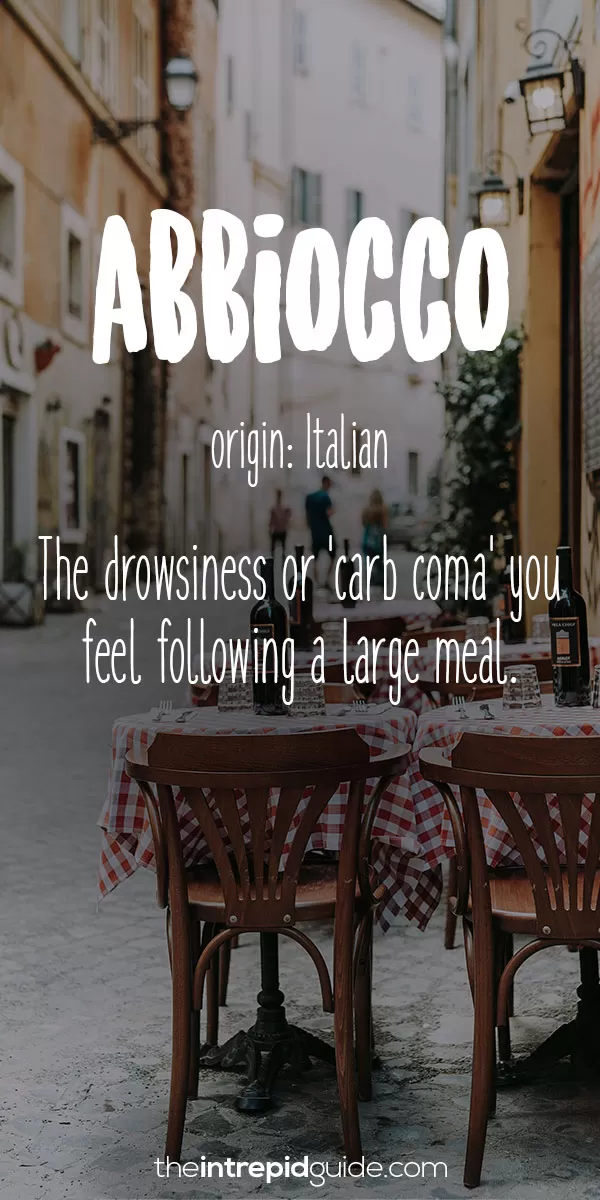
Attaccabottoni – Literally, 'attach buttons', an attaccabottoni is a communicative person who corners you to tell yous long, meaningless stories, in endless detail about their life.
Cavoli riscaldati – Literally reheated cabbage, this is essentially an try to reheat an onetime romance. In other parts of Italy, 'minestra riscaldata' or 'zuppa riscaldata', pregnant reheated soup, is used to describe the aforementioned sentiment.
Commovente – Often translated as 'heartwarming,' but information technology direct refers to being moved to tears. The verb commuovere means to move, to touch, to stir emotions.
Culaccino – Culaccino refers to the dregs in a drinking glass but also the residue or water ring left on a surface by a moist, cold glass or other small container. In Italian, 'culo' means lesser.
Gattara – A woman devoted to caring for and feeding stray or domestic cats. A more extreme version of a true cat lover.
Fare la scarpetta – To end up the contents of your plate, especially the sauce, with a piece of bread.

Acquire Italian for travel! Get my costless Italian travel phrase guide here.
Japanese
Historic period-otori (上げ劣り) – Pronounced [aah-gey-oh-toh-ree], Age-otori is a beautiful Japanese word that perfectly sums up a disaster haircut that makes you look worse than before.
Arigata-meiwaku (ありがためいわく) – This is used to refer to an act that someone does for you, even though y'all didn't want to have them do it and tried to avoid having them practise. They might have gone ahead, adamant to do you lot a favour, then things going wrong, causing you a lot of trouble. In spite of this, social conventions required y'all to still limited gratitude. What a mouthful! Yet the Japanese take a simple concise term that says it all in just ii words, arigata-meiwaku.
Bakku-shan (バックシャン) – This dating slang term literally means 'back beautiful' and is used to describe a girl who is beautiful, as long as you're looking at her from behind! Harsh! An English equivalent could exist either 'proficient from distant, but far from good', or 'Butter face up' – where everything merely her face is bonny). What makes this Japanese word so interesting is that it'due south not Japanese at all, it'due south a blended of バック (bakku, 'dorsum', from English back) and シャン (shan, 'beautiful', from German schön).
Boketto (ぼけっと) – Gazing vacantly into the distance without thinking of anything specific, in other words, daydreaming.
Chindōgu (珍道具) – A prank originating from Japan, which is done by a person seemingly inventing ingenious everyday gadgets that seem like an ideal solution to a item problem, just are in fact nothing more than a useless gag. Literally translated, chindōgu means unusual (珍, mentum) tool (道具, dōgu).

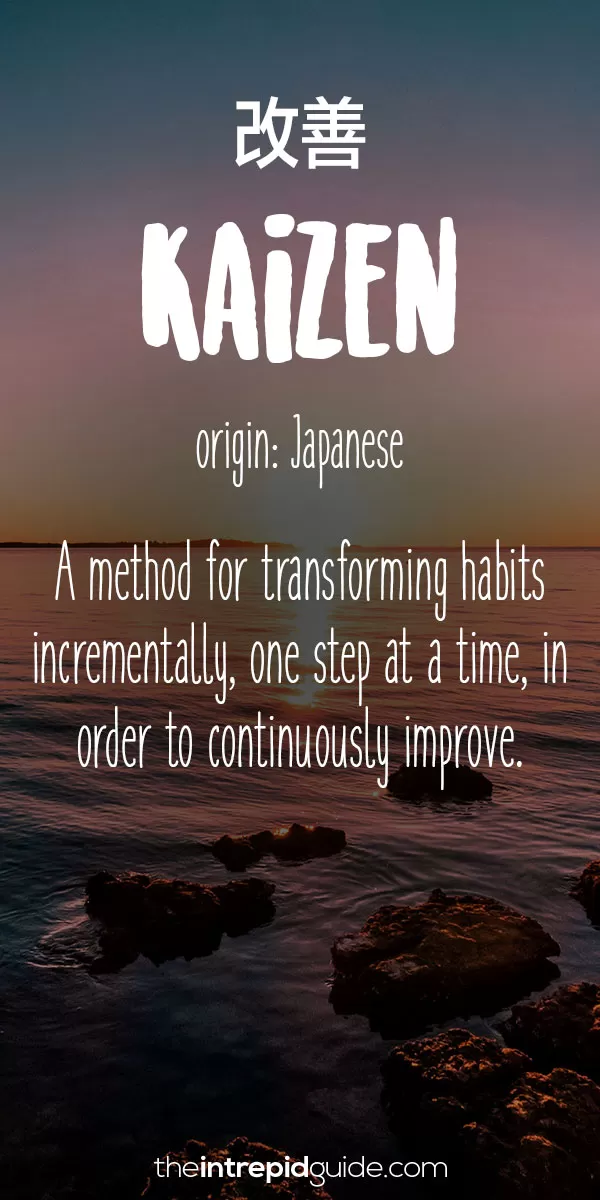


Kyōiku mama (教育ママ) – Pronounced [ky-oh-ee-kuu-mama], Kyōiku mama is an offensive Japanese term used to describe a mother who relentlessly pushes her children to attain bookish excellence. It literally translates to 'education female parent'.
Mono no aware (物の哀れ) – Literally 'the pathos of things', and also translated every bit 'an empathy toward things'. The term Mono no aware was coined by Motoori Norinaga, an eighteenth century literary scholar, who combined aware, which means sensitivity or sadness, and mono, which means 'things.' Norinaga believed that this feeling was at the very centre of Japanese culture.
Nekama (ネカマ) – Nekama refers to a certain type of male, who in their normal daily life are normally heterosexual, however, online they represent themselves as female. Thus, this term usually refers to a human pretending to be a woman on the internet, regardless of his sexuality.
Shouganai (しょうがない) – A Japanese philosophy that states that if something is meant to be and cannot be controlled, and then why worry about it? The idea is that worrying won't prevent the bad things from happening; it will only deprive you lot of the joy of enjoying the good things in life. Translated literally, shouganai ways 'it tin't be helped'.
Tatemae (建前) and Honne (本音) – Tatemae has the specific cultural meaning. It refers to the behaviour that Japanese people adopt in public, according to what is socially accepted or non by Japanese lodge. It could be translated every bit the 'public facade'. Privately held views that you would never admit in public is called honne.
Tsundoku (積ん読) – How many times have you bought a book simply never read it? This is called tsundoku, a beautiful discussion used to describe the act of buying books merely letting them pile without always reading them. The term originated in the Meiji era (1868–1912) as Japanese slang. The word consists of tsunde-oku (積んでおく, to pile things up ready for later and leave) and dokusho (読書, reading books). Information technology is also used to refer to books ready for reading later when they are on a bookshelf.
Wabi-Sabi (侘寂) – This is a beautiful Japanese concept that represents finding beauty in imperfections. It allows us to accept that growth and decay are a natural process. In traditional Japanese aesthetics, wabi-sabi is a world view centered on the credence of transience and imperfection. Wabi-sabi is a concept derived from the Buddhist teaching of the iii marks of beingness (三法印, sanbōin), specifically impermanence (無常, mujō), suffering (苦, ku) and emptiness or absenteeism of cocky-nature (空, kū).

Yūgen (幽玄) – Yūgen is an important concept in traditional Japanese aesthetics. Information technology refers to the sad beauty associated with man suffering, coupled with a sense of profound mysterious sense and beauty of the universe.
Related: six9 Wonderful Japanese Expressions That Will Brighten Your Day
Kivila
Mokita – From the Kivila language native to Papua New Guinea, mokita is a unremarkably known truth that no one wants to acknowledge or talk most.
Korean

Gosohada (고소하다) – The feeling you get when someone finally gets what they deserves. When you remember to yourself 'HA serves y'all right!', that'south Gosohada.
Gilchi (길치) – What yous telephone call someone who has a terrible sense of direction and who constantly gets lost.
Hyo – Pronounced [hee-yo], this is both a name meaning 'dutiful' and a term to describe the sense of duty children take towards their parents and the expectation that they may need to brand sacrifices for them out of respect.
Latvian

Lithuanian
Nepakartojama – A neverhoped-for-repeated perfect state of affairs. Directly translated, it means 'unable to repeat'
Malay
Manja – Manja is a person who shows so much outward love and affection towards someone they care about, similar a spouse, partner, or child, to the point where they are pampering or spoiling them
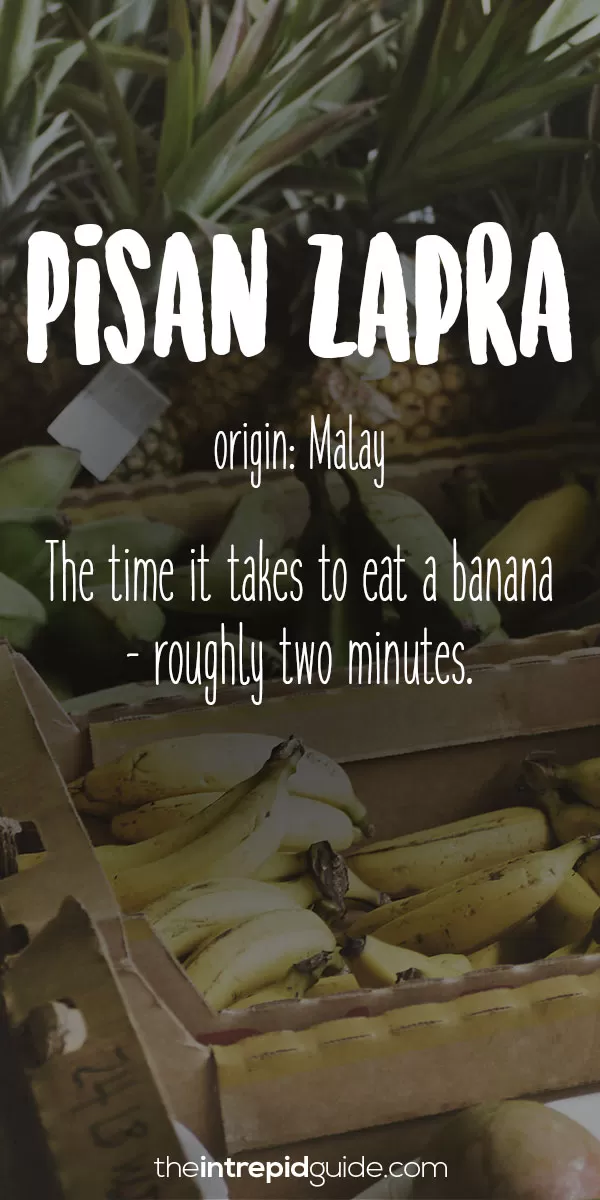
Māori (Cook Islands Maori)
Papakata – To take one leg shorter than the other.
Norwegian
Dugnad – Is a type of community day where Norwegians get together to help make clean up their neighbourhoods past fixing, cleaning, painting or just tidying things up. A dugnad takes place effectually the alter in seasons. Every Norwegian has participated in a dugnad. Information technology'south a great occasion to socialise with your neighbours, which – if you alive in Norway – yous will know is pretty rare. The added benefit is that a dugnad is normally accompanied by kaffe og kaker (coffee and cakes).

Pålegg – Annihilation that you tin can put on top of open up-faced sandwiches, such as brun øst (Norwegian Cheese) common cold cute, tomatoes, lettuce, spreads or other topping.

Uffda! / Uff da! – Is a versatile interjection and expression which basically means 'Oh, I'm lamentable to hear that'. It expresses surprise, astonishment, burnout, relief, and can be used to express empathy. It means a combination of 'Ouch for you!' and 'I'yard and then deplorable that you lot hurt yourself'. Within Scandinavian-American culture, Uff da often translates to, 'I am overwhelmed'.
Year – Yr can only be described equally a very specific kind of rainfall with tiny, most floating raindrops (or snowflakes). It'due south like to drizzle or mist but one every bit one Norwegian puts it 'Information technology paints a moving picture non but in how it'southward spelled merely how information technology's said, information technology's more a sound than a word. Likewise when conjugated: 'det yrer litt'. I see foggy whispers of misty rain in the fjords.' (Source). I remember this is the almost cute untranslatable word I've learned then far since learning Norwegian.
Learn Norwegian for travel! Get my free Norwegian travel phrase guide here.
Pascuense (Easter Island)
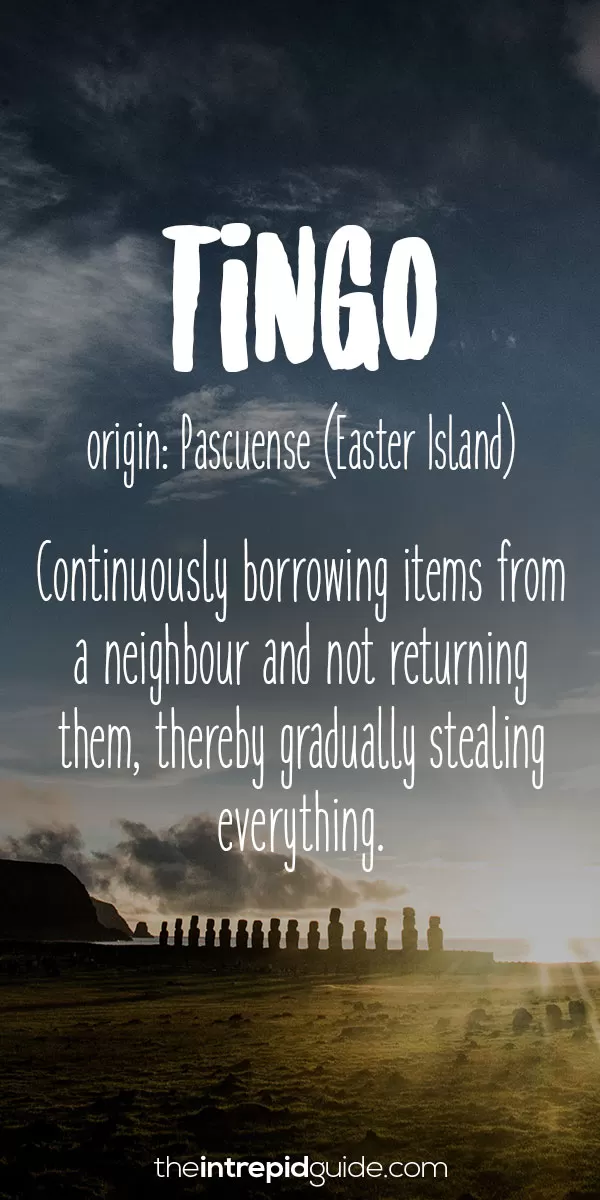
Persian
Zhaghzhagh – Pronounced [zhaang-zhaah-gh], it's the uncontrollable chattering of teeth, either due to the common cold, or from intense rage.
Smoothen
Dożywocie – A contract between parents and children, guaranteeing lifetime care in exchange for existent estate.
Formacja – Formacja is used in colloquial speech to describe a state of mind that is widespread beyond a particular generation or period of time. The closest English give-and-take would be 'zeitgeist'.
Kilkanaście – This Smoothen give-and-take refers specifically to any number between 12 and 19 and is used in a similar fashion as the English 'umpteen' or 'many', but neither translation is quite correct.
Kombinować – To brand something or try to resolve a problem with the blank minimum and in an unusual way. This could exist as a result of having limited access to resources or knowledge.
Radioukacz – Telegraphists who were role of the resistance movements on the Soviet side of the Atomic number 26 Drapery.
Zalatwic – Zalatwic means 'to get done', but in a very specific fashion and is oftentimes either illegal or bends the rules. It involves using a ransom, political clout or connections, or but personal charm to become the job done. This was especially common in Poland during the days of communism in Poland where it was probably incommunicable to alive without 'zalatwic'.
Portuguese

Desenrascanço – Desenrascanço literally means 'disentanglement', a term used in Portugal to describe the human action of 'disentangling' oneself from a difficult situation past using all available means to solve the trouble.

Larn Portuguese for travel! Get my free Portuguese travel phrase guide here.
Romanaian
Dor – A sad longing or yearning for someone.
Soare cu Dinti – When you look out the window and it looks lovely and sunny until y'all really pace outside. Soare cu Dinti describes a cute sunny, simply very common cold day.
Rukwangali (Namibia)

Russian
Listopad (листопа́дъ) – The falling of leaves.
Odnoliub (однолюб) – Someone that only has i dearest in their life or is only capable of a unmarried person at a time.
Pochemuchka (почемучка) – Pochemuchka is a person, usually a child, who asks also many questions. Pronounced [POH-chay-MOO-chka[, it comes from the Russian word pocemu [POH-chay-MUH], which ways 'Why?.' Pochemuchka was first used in a popular Soviet-era children'south book whose boy hero was given the nickname Alyosha Pochemuchka because he was never satisfied with the answers he got. Pochemuchka is a low-cal-hearted put-downwards that might be expressed in English with a alarm like 'curiosity killed the cat'.
Razljubit (разлюбить) – Razljubit is the contrary feeling of the Norwegian forelsket when you showtime fall in love. It'southward the feeling you have towards someone you were once in love with. When yous see or recollect of them, you lot may feel a twinge of affection, only by now it'southward totally platonic. That'south razljubit.
Toska (тоска) – Toska is the feeling of ache, sadness, or melancholia, even though there's no specific cause. Often spiritual in nature, this is a deep sadness that touches the soul.
Zapoi (Запой) – Zapoi describes existence drunkard for several days and waking up in an unexpected identify that you don't recognize.
Zloradstvovat (злорадствовать) – Zloradstvovat means to be devilishly happy', in the evil way, when seeing someone'southward misfortune, pain, or loss.
Learning Russian? Bank check out these hilarious Russian idioms and expressions
Samoan
Faamiti – Pronounced [fah-mih-tee], faamiti is a high-pitched noise made past sucking air through tightly-sealed lips in order to attract the attention of a pet or children.
Scottish

Suilk – Pronounced [swilk], this Scottish word means to brand an aberrant corporeality of dissonance whilst such as to swallow, gulp, or suck with a slobbering noise. Suilk is now used in English language and even has English verb conjugations, 'suilking' is the act, and a 'suilker' is i who suilks.
Tartle – The moment where you lot hesitate when introducing someone because you've just forgotten their proper name. Y'all've but tartled, and so y'all say, 'Pardon my tartle!'
Learn Scots for travel! Become my free Scots travel phrase guide here.
Serbian

Slovenian
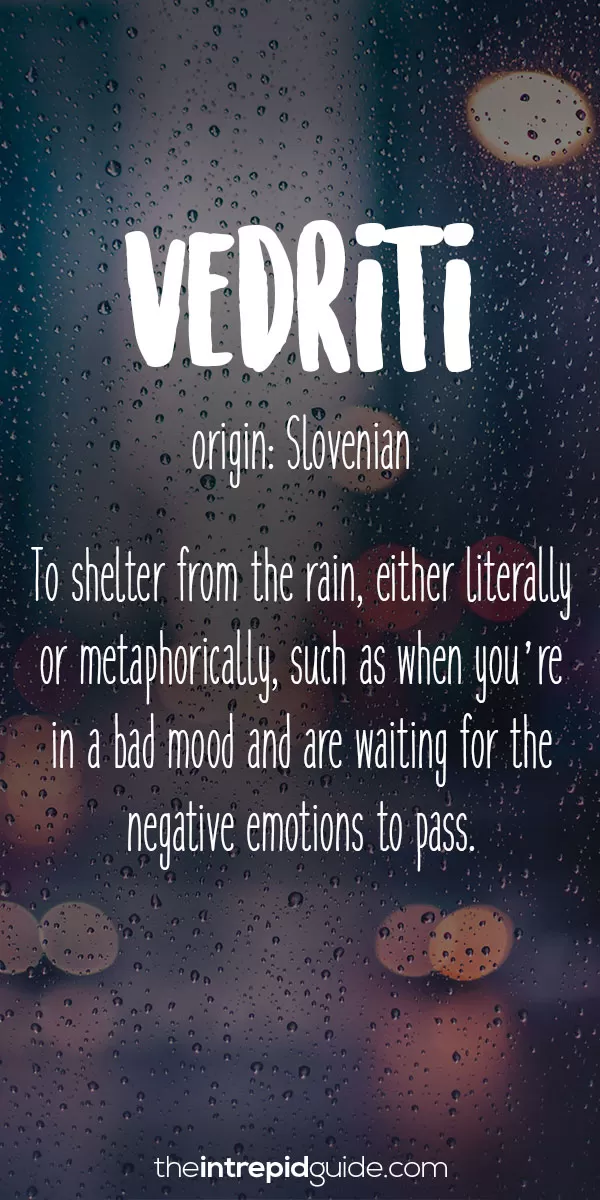
Spregledati – To simultaneously understand someone on a deeper level, whilst also overlooking information technology.
Castilian
Anteayer – This single word means 'the solar day before yesterday'. Anteayer is fabricated upwardly of the Castilian give-and-take dues, meaning before or in front end of, and ayer, meaning yesterday. In some parts of Latin America and rural Spain, antier is used instead.
Chingada – Chingada is a vulgar term unremarkably used in colloquial Mexican Spanish that shouldn't be thrown effectually lightly. It tin either refer to a special kind of hellish place that'due south far away, where you transport anyone who irritates you, like when you say 'get to Hell', or can exist used as a variation of the f-word. Chingada stems from the verb chingar which means to ruin, annihilate, screw or f**k. Similar I said, be careful how you use it, if at all!
Desvelado – While the Spanish are known for their siestas, they likewise take a word which ways the consummate opposite. Desvelado literally means 'awake' and comes from the verb desvelar, which ways 'to reveal' or 'to keep awake'. It can also be translated into English language as beingness wide awake, unable to slumber, or sleepless.
Duende – The word duende has 2 distinct meanings. The term derives from 'duen de casa' (primary of the house), referring to a magical, mythical creature or spirit such every bit an elf, leprechaun, or even a goblin found in Spanish and Latin American folklore. The 2d, and more interesting and cute definition, describes the heightened country of emotion, expression, and expression that a performer gives off that draws in the audience. Duende or tener duende ('to accept duende') is a Spanish term that is traditionally continued with flamenco and other activities that evoke Spanish peppery passion, similar bullfighting. In some parts of Spain, duende is used to describe someone who is mannerly or alluring.
Encandilar – The aftermath of seeing a sudden vivid flash of light, often associated with seeing spots. Encandilar comes from the Castilian verb encandilarse, meaning 'to be dazzled/blinded by'.
Estrenar – Estrenar ways 'showtime time' or the kickoff of something. It's used to depict the offset time y'all do, vesture or utilize something for the offset time. Don't yous just love that feeling?
Friolero – Friolero describes a person who is particularly susceptible and sensitive to cold weather, prone to easily feeling cold. A similar term also exists in Italian, freddoloso.
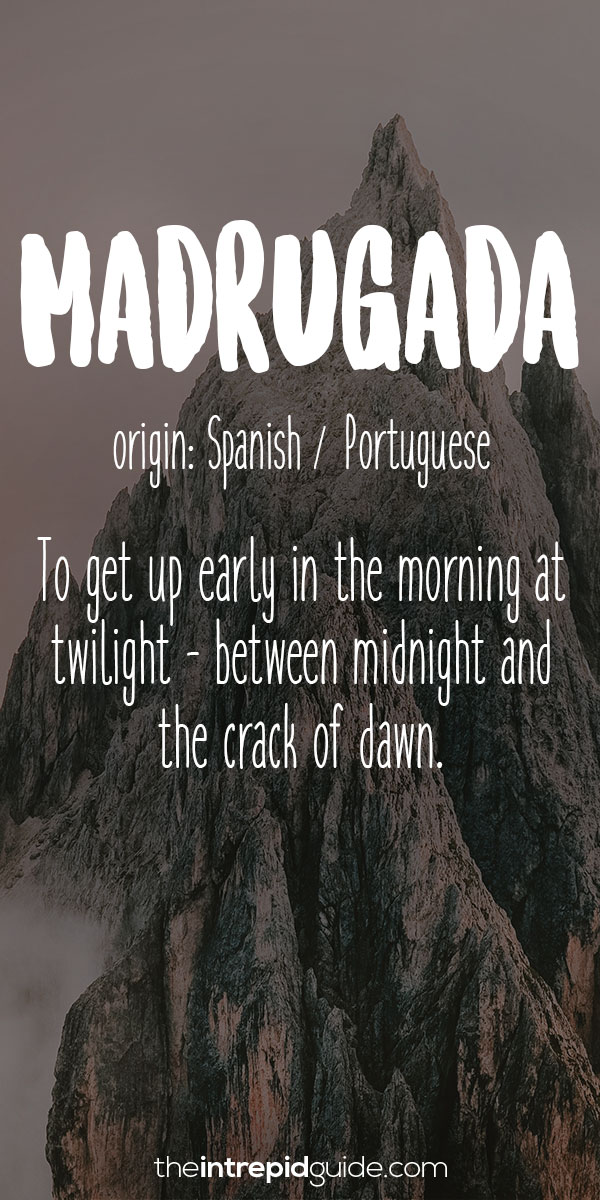
Pena ajena – Ajeno/a mostly means 'someone else'south' or 'other people'due south'. Literally, meaning 'sorry for others', pena ajena is the feeling of humiliation or embarrassment yous get upon watching another person'southward embarrassment. It's so embarrassing that information technology makes yous blench.
Sobremesa – Shared mealtimes are a very important part of Spanish civilization, and the fourth dimension spent after the meal just chatting and relaxing is very of import. So important that they fifty-fifty have a give-and-take to draw information technology. Sobremesa literally ways 'over the tabular array,' is a Spanish expression that describes that wonderful period after the meal is finished but yous continue sitting at the table chatting and bask each other's company.
Tuerto – A i-eyed man, blind in one middle .
Tutear – To speak to someone you lot know well (normally friends and family) informally by addressing using the 'tú' form instead of the more formal 'usted'. The term tutoyer is used in French to depict the same matter where the speaker uses the breezy second-person pronoun tu rather than the formal vous.
Vacinlando – Vacilando is a cute Spanish word which describes the journey or experience of travelling, is more important than reaching the specific destination.
Larn Castilian for travel! Get my free European Spanish travel phrase guide hither and my Latin American travel phrase guide here.
Swahili

Swedish
Badkruka – A person who feels somewhat hesitant or doesn't like to swim in an open up torso of water due to its depression temperature.
Blunda – Blunda is a Swedish word that means to close or cover your eyes to avoid seeing something or facing a hard truth. It'southward similar to the English expression 'turn a bullheaded center', or tin be the simple act of ignoring something.
Duktig – If a Swede says you're duktig, that's a huge compliment, because they are saying you lot're skilled, capable, or hard-working. Duktig comes from the Swedish verb duga, which means 'to exist expert for / to be acceptable for'. Y'all can use duktig on its own, just every bit you lot would say 'you're such a hard-worker!' or 'good daughter/boy!' to a child. Duktig refers to an action of some sort, whether that'due south a job or a specific chore.


Harkla – Harkla is a fantastic verb that ways something very like to 'to articulate one'due south throat'. A perfect example would be the moment before you lot're about to give a speech and make a half-cough so you tin can speak clearly.
Hinna – Hinna is a common Swedish verb that means 'to be on time' 'to notice the fourth dimension'.
Jobbig – Jobbig is an all-encompassing word that ways troublesome or trying, annoying or difficult. It can exist used to refer to people, things, events – virtually anything that is difficult, annoying, or tedious.
Lagom – Lagom means 'just the correct amount', it's neither likewise much, nor too little, merely juuuuuust right. Lagom is of import in Swedish culture, where you don't want to 'stand up out' but having or doing as well much.

Mormor / farmor / morfar / farfar – We could definitely utilise these genius Swedish compound words in English language to describe each of our grandparents. Mormor, farmor, morfar, farfar literally means mothermother, fathermother, motherfather, fatherfather – respectively. That is, mormor is your mother's female parent, farmor is your father's mother, morfar is your mother's male parent and farfar is your father's male parent. And so, the question is, practice you desire to see more of mormor and less of farfar? And then see farmor far less? And while nosotros're at information technology, barnbarn (literally, 'childchild') is the Swedish word for grandchild.
Mysa – Mysa is a Swedish verb for feeling content, cozy and enjoying oneself, peculiarly at home. Not to be confused with the Danish, hygge which relates to whatever activity or office of your solar day, mysa refers specifically to being at home.
Orka – This common verb in the Swedish linguistic communication means 'to have the energy'.
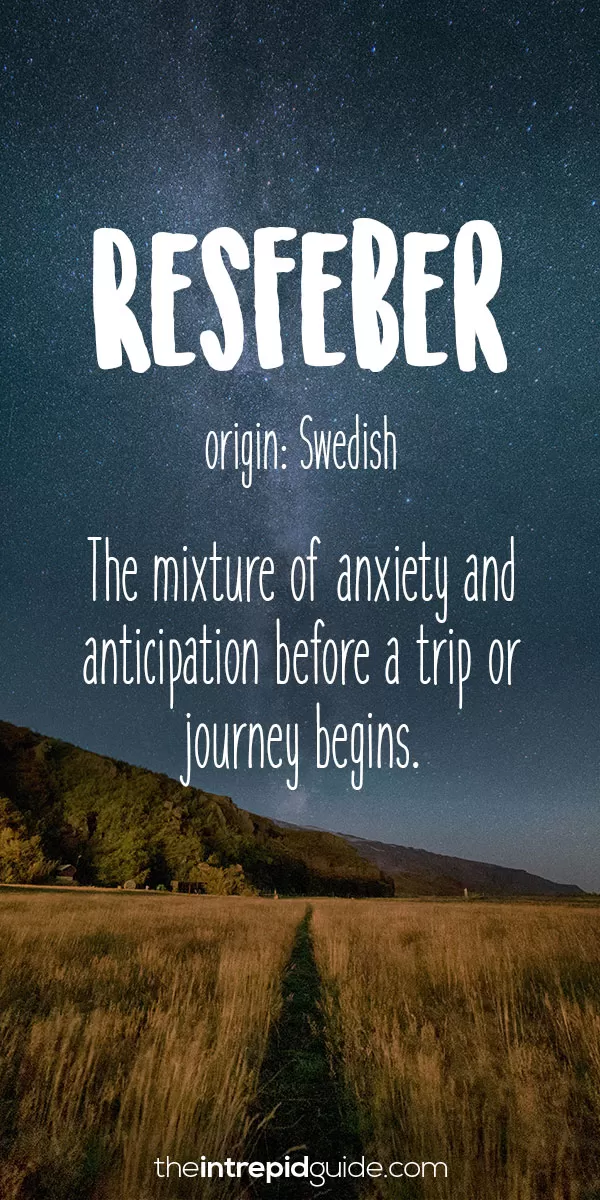
Tidsoptimist – Literally, a 'fourth dimension optimist' this is a person who is constantly late because they think they take more than fourth dimension than they actually do.
Tretår – When ii cups of coffee isn't enough, you go for a second refill or 'threefill' of coffee. In Swedish, 'tår' ways a cup of coffee and 'patår' is the refill of said coffee. A 'tretår' is therefore a second refill, or a threefill.
Vobba – Describes the very specific act of a parent taking a paid day off to accept care of their sick child simply withal work, for case they check emails or take calls. Vobba is a mash-up of the two verbs att vabba (to take intendance of a child) and att jobba (to work).
Vabba – From vobba, comes vabba, a shortened version of vård av barn, which means 'to be at home with the kids'.
Learn Swedish for travel! Go my free Swedish travel phrase guide here
Tagalog

Tampó – In Filipino culture, tampó is when a person withdraws his or her amore or cheerfulness towards someone who has hurt them. A mild case of 'to concur a grudge' where you're someone between hurt and disappointed. Information technology usually occurs between people related to each other. For example, when a married man forgets to bring his married woman flowers for their ceremony, she tin accept 'tampó' against him.
Kilig – Kilig can be roughly translated as 'romantic excitement', it describes the happiness and giddiness you feel when something romantic takes place, either to yous or someone else. It'south the feeling of butterflies in your stomach when y'all catch your crushes' eye for the first time, witnessing a matrimony proposal, or watching your favourite TV show couple.
Tamil
Oodal – An exaggerated, fake anger that usually follows a quarrel between lovers.
Tshiluba (Congo)

Tulu (Indian)
Karelu – The mark left on the peel from wearing something tight, such as jeans, socks, or a bra.
Turkish

Urdu
Goya – This Urdu word refers to a feeling of wonder and disbelief that accompanies a especially realistic fantasy. The intermission of atheism makes it seem and then real that it temporarily becomes reality. This is usually associated with expert storytelling.
Wagiman

Welsh
Glas wen – The literal translation is 'bluish smile', and is used to draw a mocking sarcastic smile.
Hiraeth – Pronounced [hither-eyeth] (roll the 'r'), this beautiful Welsh word is much like the Portuguese saudade mentioned earlier or the Romanian dor, it conveys a feeling of homesickness, sense of regret, along with a general sadness over the lost or departed. This is a longing for one's homeland, or even a romanticized past, with a yearning for it to come up dorsum.
Yaghan
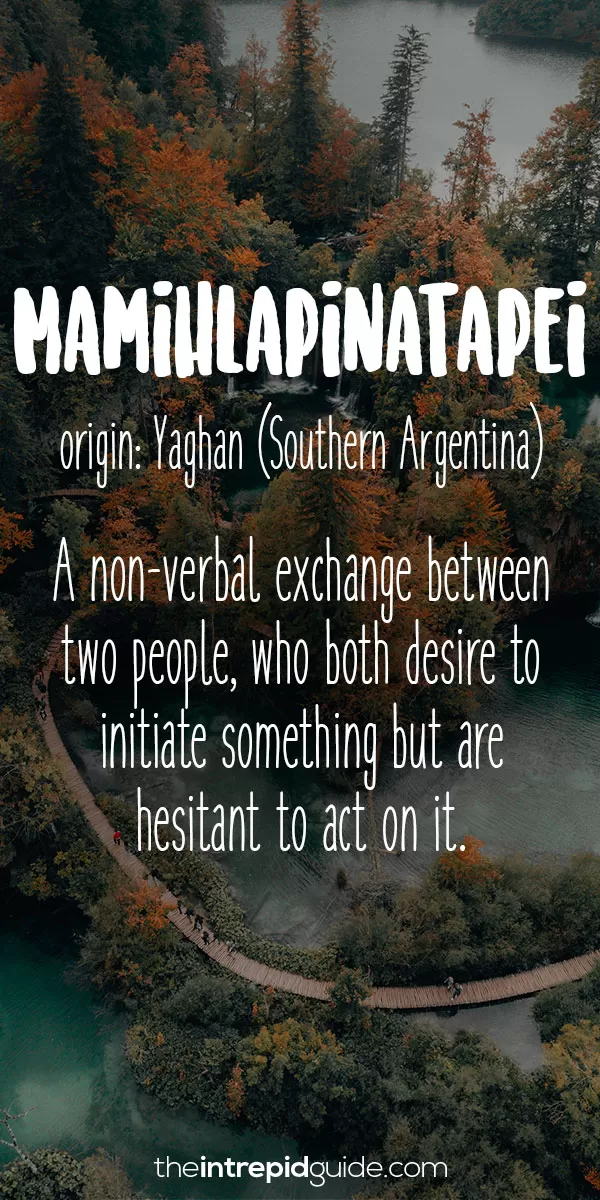
Yiddish
Shlimazl (שלימזל) – A chronically unlucky, usually inept, clumsy person.

Luftmensch (לופֿטמענטש) – Luftmensch is used to refer a person with their head in the clouds. They are more concerned with blusterous intellectual pursuits than applied matters like earning an income. From the Yiddish לופֿט (luft, 'air') and מענטש (mentsh, 'man').
Farpotshket – Pronounced [fahr-POTS-SKEHT], farpotshket is when you or someone yous trust tries to fix something but only ends up making things worse, causing irreparable damage. All you lot can do is shrug, knowing that you should've known better. Farpotshket also has an associated verb – potshky (POTs-ski), which means 'to fiddle with something in a well-meaning and purposeful way, just with a consummate lack of competence.'
Chutzpah – Is an untranslatable Yiddish give-and-take for adopting a 'don't-take-no-for-an-answer' attitude where you'll build up the guts to practice something epic.
Zulu
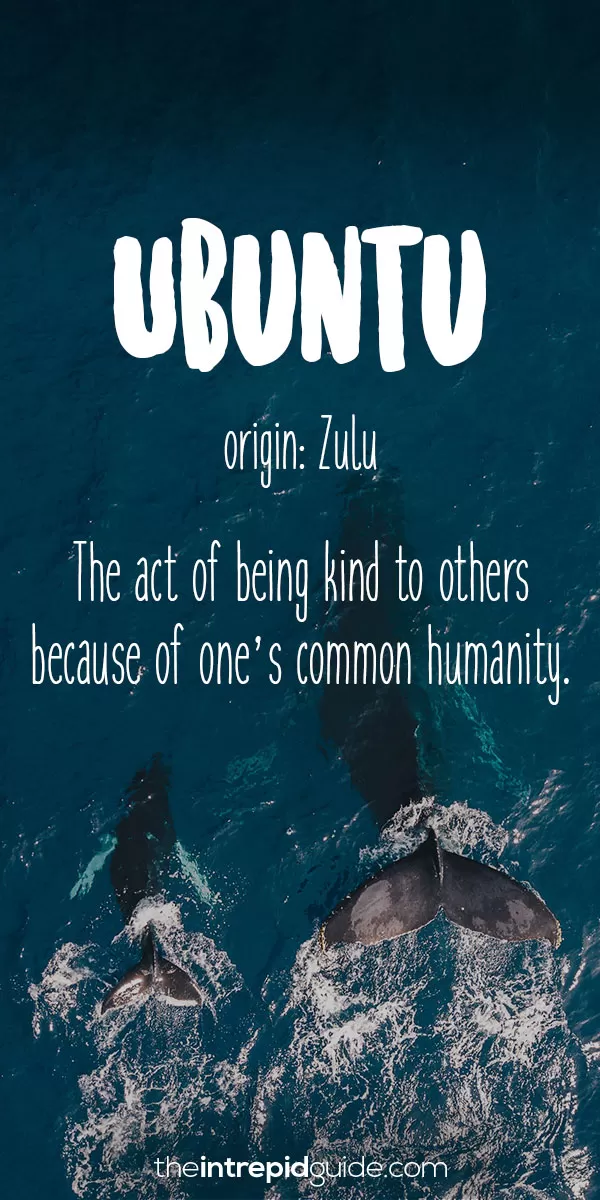
Over to you!
Which one of these words in your favourite? Was it the Malay, pisan zapra – the time it takes to eat a banana or the Portuguese cafuné – the act of tenderly running your fingers through someone'due south hair. Share your favourites in the comments.
Can you think of whatever other 'untranslatable' words? Have you lot ever come across words and phrases that could not exist translated into your native linguistic communication? Permit me know in the comments and I'll add them to the list!
Want to know more almost learning languages? Offset here!
- 22 Pinnacle Language Learning Resources You Should Apply
- How to Say 'I Beloved You' in 128 Different Languages [Ultimate A-Z Guide]
- How to Learn Languages Like Crazy, Even If You Have a Crazy Life [3-Step Method]
- 10 Proven Memory Hacks: How to Remember New Vocabulary Faster
- How long does it Actually take to learn a language? [A Practical Guide]
- xviii Unexpected Advantages & Health Benefits of Learning A Foreign Language
- 23 Absurd Gift for Language Learners They Will Actually Employ and Love
- Memrise vs Duolingo: Which Language App is Best For Y'all?
- Mondly Review: 10 Ways Mondly Drastically Improved My Language Learning
- half dozen Linguistic communication Learning Tips: How to Learn a Language from Home
- What Blazon of Language Learner Are Yous? Your four-Step Personalised Learning Plan
- 44 Best Movies on Disney Plus for Learning Languages
- 13 Means to Seamlessly Integrate Language Learning into Your Daily Life
- 10 Pro Tips: How to Learn a Language with a Full-Fourth dimension Chore
- 7 Reasons Why Y'all Should Proceed a Linguistic communication Holiday
- Essential Travel Phrases: How to exist Travel Fluent in 10 Simple Steps
- How to Acquire Your First Foreign Language in eight Unproblematic Steps: A Beginner's Guide
- 11 Life-Changing Reasons Why Y'all Should Learn a Language
- 42 beautiful Inspirational Quotes for Language Learners
- Language learning tips: 11 Polyglots Reveal The Secrets of Their Success
- Acme x Best Means to Acquire a Language Better and Faster
- How Many Languages are there in the World?
- 78 FREE Dictionaries to Learn a Language Fast [Free eBook Download]
- 22 Central Travel Phrases That Will Transform Your Travels [Free Guide]
Like it? Pin it for later!

celentanothakildis.blogspot.com
Source: https://www.theintrepidguide.com/untranslatable-words-ultimate-list/
0 Response to "Words to Describe Feelings You Didnt Know Existed"
Post a Comment